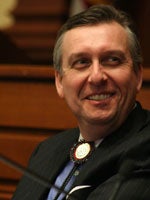The future of Native American sovereignty under the Roberts Court is bleak, a panel of experts concluded at an April 6 conference examining “Tribal Justice: The Supreme Court and the future of federal Indian law” at Harvard Law School.
The event—which brought together leading legal scholars, practitioners, and tribal leaders, many of whom were HLS alumni—was co-sponsored by a number of groups at Harvard, including the Native American Law Students Association and the Charles Hamilton Houston Institute for Race and Justice.
Raymond Halbritter ’90, a representative of the Oneida Nation and CEO of Oneida Nation Enterprises, opened the event by discussing a 2005 case, City of Sherrill v. the Oneida Nation. The Court ruled against the Oneida Nation in the case, which answered the question of whether or not the Oneida Nation should pay taxes on reservation land it sold and then bought back in the 1990s.
In the 8-1 decision, the Court found that the Oneida Nation had “relinquished governmental reins and could not regain them through open-market purchases from current titleholders.”The ruling dealt a huge blow to tribal sovereignty, Halbritter said.
In the first panel of the day, experts traced the history of federal Indian law from Marshall to Rehnquist. Three cases decided in the 1820’s—the so-called “Marshall Trilogy”—established the notion of tribal sovereignty as a cornerstone of American law. The benchmark cases affirmed that federal law governs the relationship between the government and tribes, which were described as “Domestic Dependent Nations.”
N. Bruce Duthu, a professor of Native American studies at Dartmouth College, explained that these early cases were based on a set of historical circumstances and assumptions that no longer exist. There was more land available in the 1820’s to separate tribal nations and non-Indians, for example. Moreover, the assumption was that American Indians would not survive. “They [the courts and legislatures] were constantly planning our funeral,” he said.
As time passed, and non-natives came into more frequent contact with Native Americans, Courts increasingly ruled against tribal sovereignty when disputes involved non-natives on tribal lands.
Today, “When the Indians win one, it’s an accident,” said Professor Robert Odawi Porter ’89, director of The Center for Indigenous Law, Governance, and Citizenship at Syracuse Law School and member of the Seneca Nation.
Federal Indian law, the panelists concluded, has become unmoored from the Marshall rulings. Harvard law School Professor and expert in American Indian law Joseph Singer ’81 used the Court’s February 2009 decision in Carcieri v. Salazar as an example. The case took up the question of whether the Narrangansett Tribe in Rhode Island may receive benefits under the Indian Reorganization Act of 1934 if the tribe was not federally recognized on the date of enactment. The decision, written by Justice Thomas, was dripping with “disdain, and almost no reasoning [was] given,” Singer said. The Court clearly has no fear of backlash regarding American Indian law, he concluded.
Another panel answered the question, what is the future of federal Indian law under the Roberts Court? The unanimous answer from the panelists was that tribal sovereignty will be severely curtailed in the coming years.
Richard Guest, co-director of the Supreme Court Project at the Native American Rights fund, said the goal of this Court is assimilation. “Roberts views termination of tribal sovereignty as being as good as ‘motherhood and apple pie,’” he explained, quoting Roberts himself. “Our goal today is not to win anything, but to keep cases away from the Supreme Court entirely.”
The strategy of appealing to “inherent sovereignty is doomed,” according to Gavin Clarkson ’02, an associate professor of law at the University of Houston and a member of the Choctaw Nation. Instead, he suggested that the future of tribal sovereignty lies in building institutions that prevent outside entities from conducting business on the reservations.
“We need our own judicial system, our own banks, our own financing, corporations and business infrastructure.” Clarkson said. He concluded by discussing how many tribes today are doing this with great success.
Keynote speaker Philip “Sam” Deloria, director of the American Indian Graduate Center, Inc. and member of the Standing Rock Sioux Tribe, concurred with the panelists’ opinion that the primary threat to tribal sovereignty lies in cases involving disputes between Native Americans and non-Natives.
The future of tribal justice, Deloria said, lies not with the Court, but with the tribes themselves and their ability to engage in negotiations that realistically address the concerns of non-Indians in the political arena. “The plenary power of Congress is our best friend,” he said.
Other panelists at the event included: Steven Paul McSloy ’88, co-chair of the Native American Practice Group at Hughes, Hubbard & Reed LLP; Alexander Tallchief Skibine, S.J. Quinney Professor of Law at the University of Utah; Lorie M. Graham LL.M. ’95, professor of law at Suffolk University; Bethany Berger, Oneida Indian Nation Visiting Professor of Law at HLS; and Rebecca Tsosie, professor of law at Arizona State University.
— Margaret Salinger
